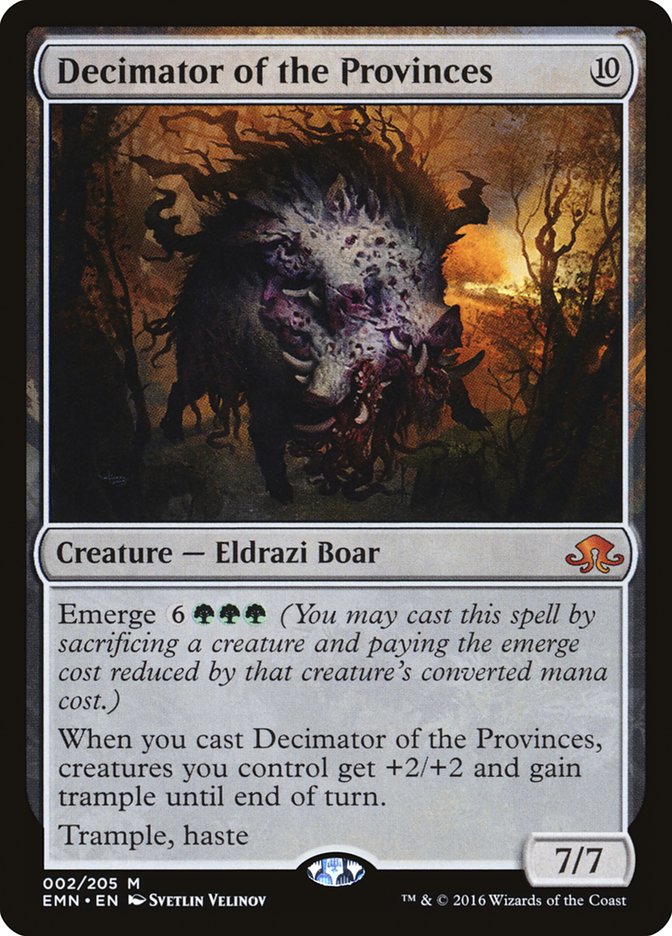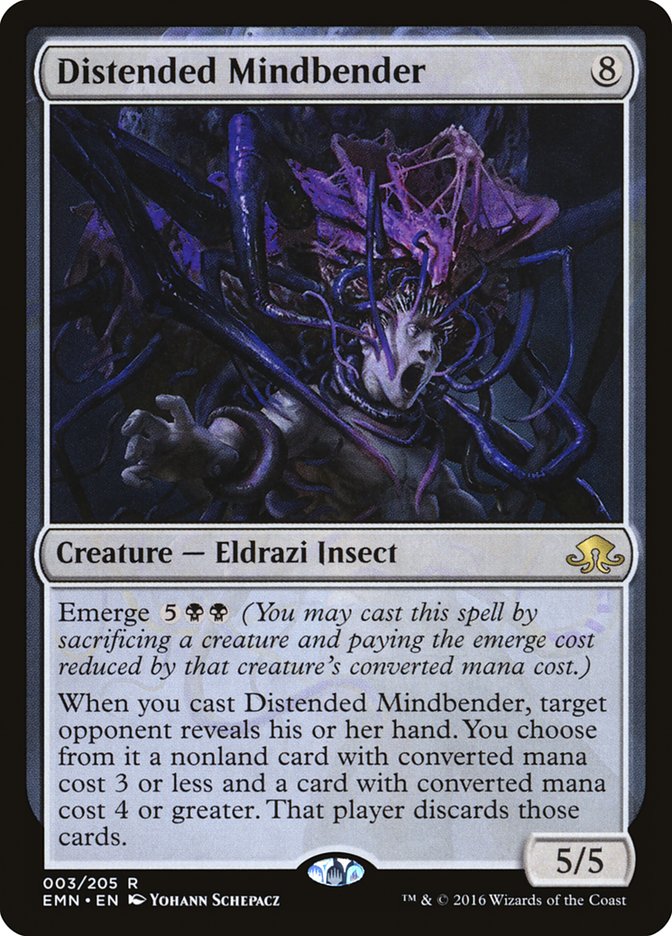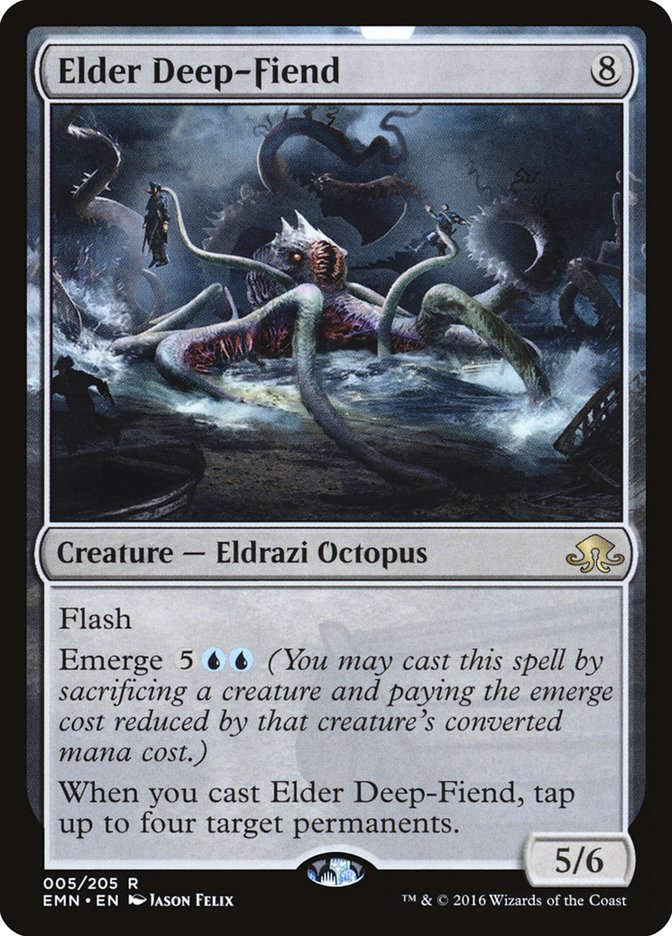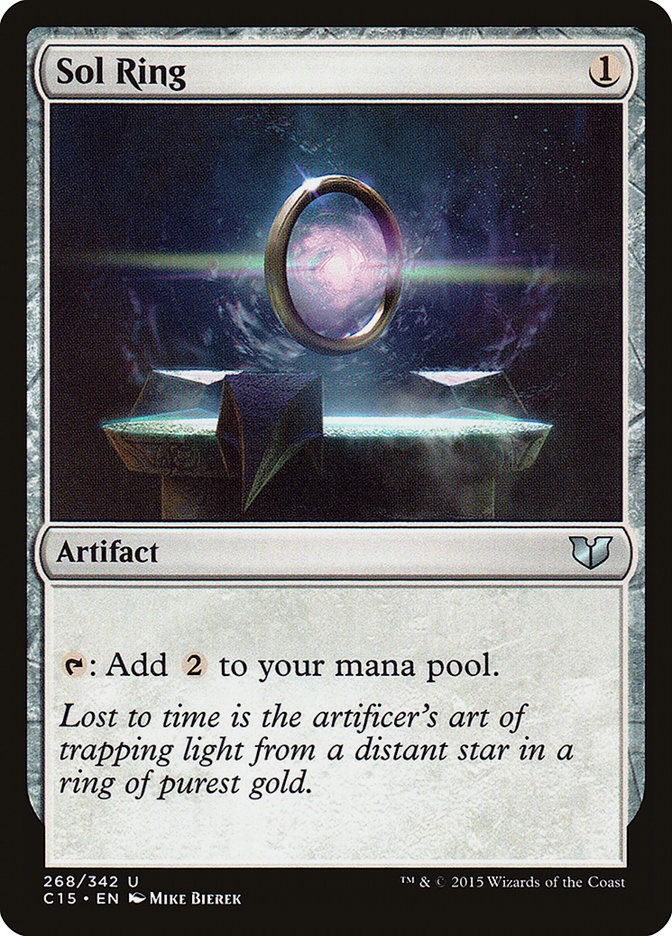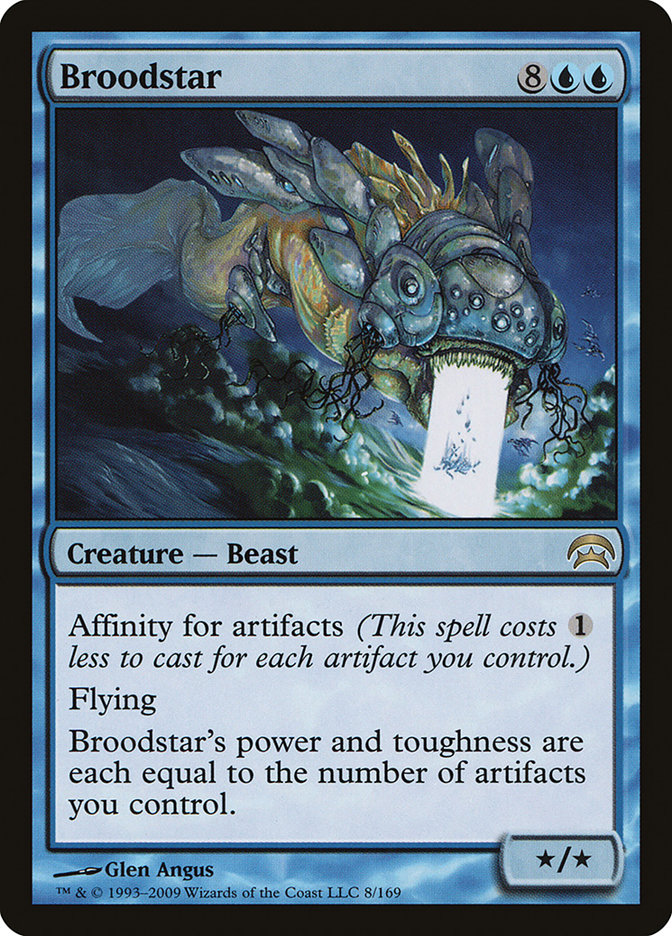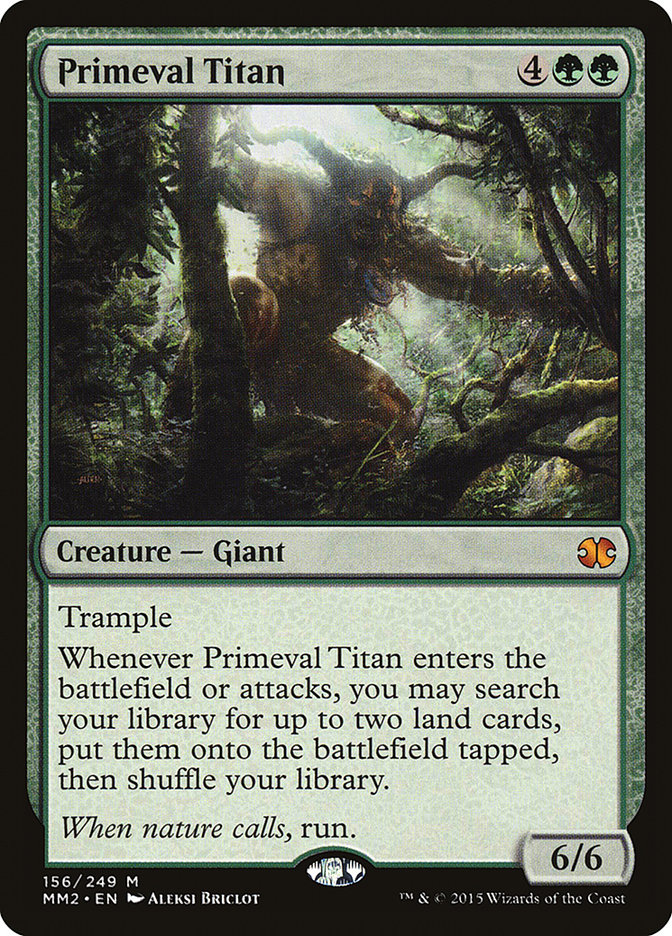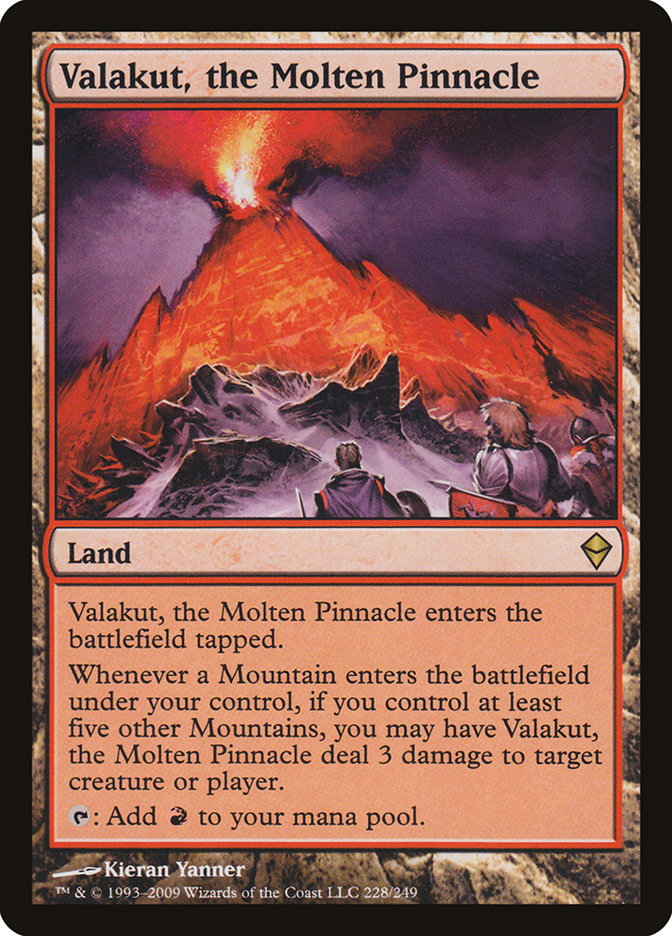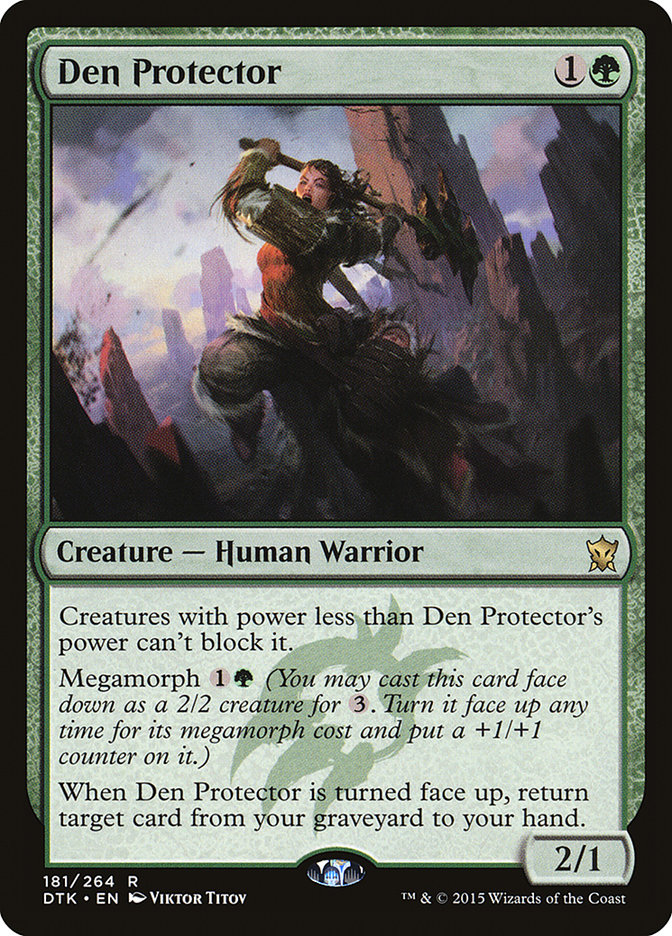Over the last few weeks you’ve been bombarded by everyone, myself included, explaining to you why the cards with emerge are extremely powerful.
Broken.
Fundamentally flawed.
Should have never happened.
Oops!
Plenty of words have been used to describe emerge and some of the cards that are capable of being “cheated” onto the battlefield for their alternate cost. With a lot of testing and even more information, it’s safe to say that when Michael Majors brought a rudimentary U/R Eldrazi emerge deck to the table for his VS Video, his prediction of “this should have never been printed” was more than likely an understatement than hyperbole.
Today I want to explore just how badly emerge could alter Standard as you know it. This isn’t some adorable flash-in-the-pan mechanic that will make a brief splash before disappearing as a novelty, and at its core, emerge is the basis for something in Magic that is historically very, very troubling.
What Emerge Gets Right
Before discussing why emerge is dangerous, I think it’s important to talk about the things I really love about emerge.
First and foremost, emerge is one of the most flavorful mechanics that Wizards has created in years. The idea that a creature you control can essentially erupt into a much more terrible Eldrazi beast is, for all intents and purposes, the coolest thing ever. We’ve seen since Battle for Zendikar the effects of Eldrazi on the ecosystems in Zendikar and now Innistrad, and to finally have a mechanic that says “your little creature explodes with full Eldrazi infection to become a juggernaut” blows me away with creativity.
These three creatures are immensely strong and all have game-altering properties in their own unique ways. Decimator can take a small swarm of creatures and turn them into a full-fledged onslaught. Distended Mindbender is quietly the best mid-game monster in Standard, and it isn’t particularly close. Elder Deep-Fiend is being heralded as the second coming of Mistbind Clique, only much larger and capable of being searched out by Sanctum of Ugin at instant speed.
All three of these are incredibly threatening in their own right and will alter deckbuilding at its core. This is the kind of shakeup that a lot of Magic players seem to enjoy when a set is released; it’s so extreme in nature that the entire format enters a sort of convulsion where it’s impossible to pin down what to do properly, and everything is in chaos.
There’s a lot to be said for these kinds of formats. They have the possibility to be a great deal of fun. Nothing is set in stone, and cards that might not see a ton of play all of a sudden bust out on the scene because they’re an answer. It’s bedlam, and for some people, that’s beautiful. Even the lesser-powered emerge creatures are going to see play. Wretched Gryff is a good body that cycles upon casting. Abundant Maw does a Siege Rhino impression as a 6/4 that you can easily cast for three or four mana. These cards are nothing to scoff at.
Overall, emerge is going to shake up Standard quite a bit. Eldritch Moon seems like a massive hit. The days of bowing to G/W Tokens are likely over, as the deck as made a living being a premier midrange strategy, and it’s about to deal with eight- and ten-drops coming down on their bread-and-butter turns.
Get ready for a brave, albeit strange new world.
What Emerge Gets Wrong
Awesome. Enough with the fluff.
Oh sweet heavens.
What were they thinking?
Free mana or heavy mana reduction is unequivocally the worst idea that keeps happening throughout Magic history. It’s always implied that this time it’s safe, but it isn’t. It never is.
Free spells have a history dating back to the inception of Magic but really came into their own during Urza block. Afterwards we were blessed with Mirrodin and the delight that was Affinity. Only a few short years later, cascade made casting Lightning Bolt plus Mind Rot off a 3/2 hasted creature fun for the whole family. Right now you’ve got Collected Company putting six mana worth of creatures onto the battlefield for only four mana, and doing it at instant speed. None of these things have ever been broken, right?
Emerge is the next heir apparent to “things you shouldn’t be allowed to do in Magic,” yet this is the world we’re about to live in.
That strange new world I joked about early?
It’s going to suck royally for the people who don’t prepare for it.
Not just dangerous, because cheating huge creatures with game-breaking effects onto the battlefield has always been historically devastating, but moreso what it does to warp the format. If emerge is as dangerous as the best minds in the game are telling us it could be, games will degenerate into two different, but equally as intricate states:
1. Wars to power out your emerged threats faster. This means cards like Hedron Crawler and Deathcap Cultivator basically become Dark Rituals on a stick, adding three mana to the emerge. By turn 5 this means Distended Mindbenders, and even faster if you played, say, a turn 3 Thought-Knot Seer and then powered it out on turn 4. Mana accelerators aren’t nearly as good as they used to be, but in the two-drop slot they may become more playable and important.
2. Wars to combat emerge creatures. A resolved Distended Mindbender on turn 4 or 5 can be lights out to a midrange deck. It’s that powerful. To stop this, spells like Summary Dismissal go up in stock. Along with them, Transgress the Mind and Infinite Obliteration gain traction. Transgress is already a card that sees play in maindecks, and this might give decks like W/B Midrange a better metagame presence simply because they have faster and more agile tools when it comes to dealing with emerge threats.
There’s also the subgame of “Who can cast their emerge card first?” Games where both players are utilizing emerge cards will often come down to tapping out your opponent first with Elder Deep-Fiend and then following that up with another Deep-Fiend if you were able to search one up with Sanctum of Ugin or just naturally drew one. Mindbenders are really good at removing opposing Mindbenders. It may just come down to who can start dropping massive threats faster.
It’s similar to how Primeval Titan mirrors used to work, when the answer to winning the mirror match was to simply be faster than the other player. Valakut players began incorporating one-drop mana accelerators in their deck so they could be a turn ahead in a game where it the player to attack with Prime Time first won. If emerge creatures are able to reach that level, it should be noted that being quicker than the player packing the same spells is the best way to win those games.
This means fast, agile, and very powerful decks based around achieving the biggest and baddest Eldrazi monsters as quickly as possible. You’ve seen flashes of it in Standard with the Red Eldrazi deck and its curve of Thought-Knot Seer into Reality Smasher, but imagine what you’re in store for if you think you’ve weathered that storm? Reality Smasher is five hasted damage and then five mana towards a severely cheapened emerge threat.
Now I know what you’re saying to yourself.
“Reflector Mage will save us all.”
First off, smack yourself for saying that. You sellout.
That’s a super-cute notion, though, but the kinds of decks that will be playing these emerge creatures are going to have a massive density of heavy-hitting monsters. A single bounce is only going to prolong the inevitable as they drop many high-powered things on the battlefield.
My fear, and that same fear has been echoed by many friends as well as they playtest their way through the new format to prepare for #SCGCOL, is that the velocity generated by these decks is not something this format is ready to handle. Decks like G/W tokens and Bant Humans won’t be able to sustain a proper gameplan against their hands being torn to pieces or their permanents being tapped down, allowing them to kill Gideon, Ally of Zendikar and functionally obliterate their opponent.
How to Beat Them
As of right now, no strategy is clearly working against these humongous emerge creatures. The best I’ve seen thus far is simply swarming around them with the Tom Ross W/R Humans deck, but even that loses steam if they win the dice roll.
However, this does show that they can be beaten. Going under emerge decks seems like the best thing possible you can be doing. If that’s not your cup of tea, blue-based decks with Summary Dismissal are your next bet to double down on. The control decks may get off the counterspells, but letting a Distended Mindbender pick apart your hand isn’t what you’re going to want in the long run, so Dismissal is the most logical step. Is it too slow for the other decks in Standard? Almost certainly! That’s why emerge has put us in such a funny spot. We have to contend with speed and efficiency.
Aside from counterspells and fast creatures, efficiency is going to be your next play. Cards like Den Protector are somewhat proactive against Mindbender and will at least let you buy back a card that you were forced to discard. Collective Effort is another spell I think may see reasonable amounts of play because of emerge, letting you kill a big creature while also pumping your team to commence an alpha strike. If emerge is built on natural two- and three-for-ones, recouping that card advantage is going to be paramount.
While I do feel a tad like Chicken Little, I am not proclaiming that the sky is falling. On the contrary. Standard has felt very bland for the last few months, devolving into G/W Tokens dictating the pace of the metagame with specific decks like U/W Spirits coming out of the woodwork and achieving such prominence strictly because of their prowess against G/W. At this point, we need a shakeup, and emerge decks are going to challenge G/W Tokens on the fronts it isn’t prepared to fight on.
Do I believe emerge was a mistake?
Absolutely. Over the years we’ve learned that cheating mana or making “freer spells” is never a good idea. We’ve seen this movie. We know how it ends. You just had an Eldrazi Winter. I really hope you enjoyed spring, because we’re entering the genesis of Eldrazi Summer.
Bob Ross has taught me that there are no mistakes. Just happy little accidents.
Well…I’m pretty sure #SCGCOL is going to bear witness to a ton of happy little accidents on camera.


